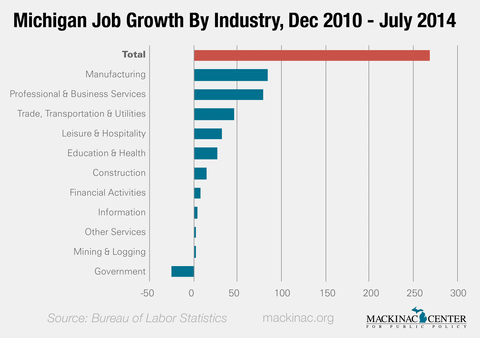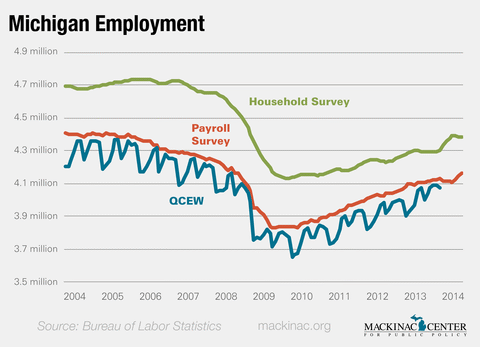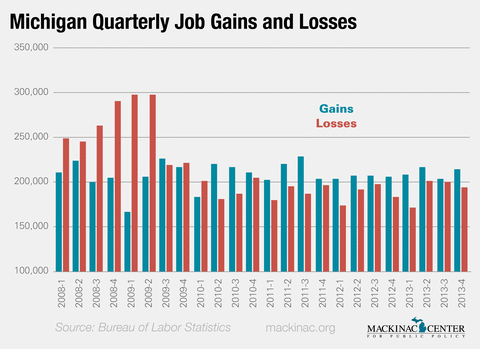Did Gov. Snyder Create 275,000 jobs?
An explanation of Michigan economic growth (with charts)
There can be no question that the Michigan economy is recovering — only about the magnitude of the growth. The level of growth depends on where you look. As we get closer to the November general election, more people will question the degree of growth and whether the Snyder administration and Legislature has helped or hindered the state recovery.
Gov. Snyder and his campaign team claim he has helped create "more than 275,000 jobs." Let's take a deeper look at that number.
There have been substantial job gains in the payroll survey during Gov. Snyder's first term. This is a monthly survey that goes out to a sample of employers to find out how many jobs are in Michigan businesses and in what industries. Its releases are frequently in the news. Since December 2010 — the last month prior to the Snyder administration — Michigan added 269,700 jobs. This is a 7 percent increase in the number of jobs in businesses in Michigan.
The largest gains were in manufacturing industries (which sustained heavy losses in the recent recession and through Michigan’s decade-long recession) and professional and business services, which includes consultants, temporary employment groups, and employee leasing agencies among others. The transportation equipment manufacturing sector accounts for roughly 40 percent of the growth in the manufacturing field.
A different look comes from the household survey. This samples a number of Michigan residents and finds out how many people are employed and unemployed. This is a similar measure of employment but it looks at the number of people in Michigan who are employed rather than the number of jobs in Michigan businesses.
The household survey shows a substantial but more mitigated recovery. Employment increased by 217,115 jobs — a 5.2 percent gain.
A separate measure covering information from all employers that participate in the unemployment insurance system also gives a look at the employment picture. This is the quarterly census of employment and wages and gives the most detailed look at employment by sector. Unlike the two monthly surveys, information from this project lags by two quarters. From December 2010 to December 2013, this source showed an increase of 251,835 in jobs — a 6.5 percent gain.
It should also be noted that the recovery began prior to the beginning of the Snyder administration in these three data sources.
These two are monthly snapshots of the economic picture. As such, they hide some of the changes in the economy. Businesses are constantly being created, others adding jobs, more losing jobs, and some closing. While on net there are more jobs in Michigan, there’s been a lot more creation and loss.
According to the Bureau of Labor Statistics Employment Dynamics data, Michigan added 2,520,816 jobs and lost 2,271,762 jobs since 2011 began, showing a net gain of 249,054 jobs.
But the rates of both job growth and job loss fell slightly.
Even though these trends are down, there is a substantial amount of job turnover suggesting that the best way to improve the economy is to enact broad-based improvements to the business climate. The Snyder administration has many accomplishments on this front — for instance, a right-to-work law, replacing the Michigan Business Tax with a smaller and less burdensome corporate income tax, and creating new exemptions to the personal property tax, among others. And there’s perhaps a chance that his efforts to get employers connected with job seekers can help.
The impact of these policies on the scope and direction of the state’s recovery is a good question. In 2012, University of Michigan economist Don Grimes found that the state’s job growth cannot be fully explained by its industrial mix. The size of the gains, however, was much less than the total increase in job growth. That is to say that policy may be playing a role in the state’s job growth, but the general economic recovery does as well.
There is much to be optimistic about Michigan, especially since this recovery is the first sustained increase in employment since 2000. There have been millions of jobs created and lost, mostly without direct permission or encouragement by policymakers. Governors have some ability to change policies to create growth and Michigan performed stronger than can be expected.
Michigan Capitol Confidential is the news source produced by the Mackinac Center for Public Policy. Michigan Capitol Confidential reports with a free-market news perspective.




 Michigan taxpayers foot $1 million bill for an imaginary job threat
Michigan taxpayers foot $1 million bill for an imaginary job threat
 Whitmer whiffs at real auto jobs numbers, again
Whitmer whiffs at real auto jobs numbers, again
 Michigan a top 10 state — for not creating jobs
Michigan a top 10 state — for not creating jobs